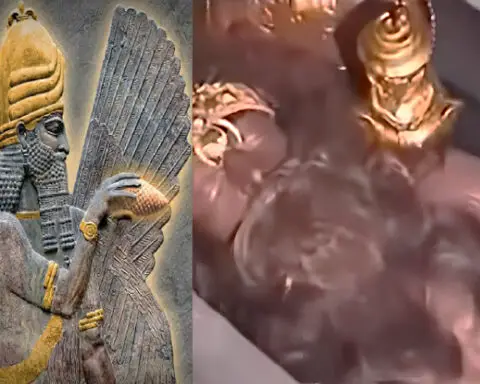In the shadowy corridors of cinematic history, there lies a tale so intriguing and wrapped in mystery that it rivals the plot of any thriller—the story of the Anunnaki movie, a project shrouded in secrecy and controversy even before its audience could lay eyes on it. This narrative isn’t merely about the suppression of a film; it’s a glimpse into the profound power of knowledge and the lengths to which some entities will go to keep certain truths under wraps.
The Global Ban Before Premiere: The Anunnaki Movie Enigma
Imagine the anticipation surrounding a movie promising to unveil truths so profound they could alter our understanding of history itself. The Anunnaki movie was such a project, promising an exploration into the ancient Sumerians and the Anunnaki—deities believed to have played a pivotal role in the formation of human civilization. Yet, this film was abruptly silenced through a worldwide ban, sparking a myriad of questions and theories. What was so volatile about its content? Who feared its release, and what secrets did it threaten to expose?
Visionary Ambitions: The Genesis of the Anunnaki Movie
Planned for release in 2006, the Anunnaki movie aspired to be more than a spectacle; it aimed to enlighten. Drawing on Zecharia Sitchin’s interpretations of ancient Sumerian texts, the filmmakers sought to bridge the gap between ancient mythology and contemporary understanding, offering a narrative that promised to challenge our perceptions of history. The goal was audacious—to present a story that might not only entertain but also illuminate the murky avenues of our past.
The Forces of Suppression: Quelling the Anunnaki Discourse
The journey of the Anunnaki movie from anticipation to oblivion was marked by an increasingly tense narrative. What began as excitement soon turned into apprehension among those in power. The prospect that the film could unravel the tightly knit fabric of our historical understanding became too threatening. Officially, financial woes were cited as the reason for its shelving, but this surface-level explanation belied a deeper, more orchestrated effort to keep the film from seeing the light of day. This was not merely about money; it was about controlling the narrative, about the fear of a story that could potentially rewrite history.
Forbidden Knowledge: The Legacy of the Anunnaki Movie’s Censorship
The outright ban of the Anunnaki movie is a poignant testament to the lengths certain powers will go to maintain control over historical narrative and knowledge. By keeping the film from the public eye, a clear message was sent—some truths are too potent to be shared. This act of suppression opens a Pandora’s box of ethical and philosophical questions regarding the control and ownership of knowledge. Who decides what history is told, and what implications does this have for our society?
Legacy and Questions Unanswered: The Mystique of the Anunnaki Movie
Ironically, the suppression of the Anunnaki movie has only amplified its legend, transforming it into a symbol of the eternal battle between the quest for truth and the forces of control. The intrigue surrounding the film’s forbidden revelations continues to stir debate and speculation, serving as a reminder of the fragile nature of our understanding of history. This narrative goes beyond the confines of cinema, touching on the essence of power, knowledge, and the shaping of reality.
The Anunnaki movie, in its silenced state, becomes more than a lost piece of film history; it emerges as a beacon for those who question, and dare to look beyond the veil of accepted truths. It challenges us to consider the unseen influences that shape our perceptions and to recognize the ongoing struggle over the narratives that define our past, present, and future. This story is a call to question, to seek, and to wonder about the true extent of our historical legacy and the forces that guard its gates.
VIDEO 1:
VIDEO 2:










